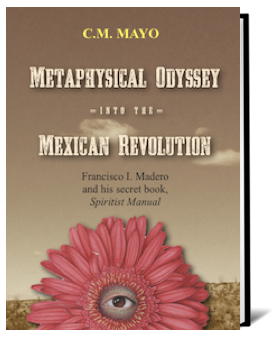.
MADERO'S SECOND, SECRET
BOOK
 Now
when we come to Madero's second book, Manual espírita,
or Spiritist Manual, there are two reasons the subtitle
of my book calls it his "secret book": First, he wrote
it under a pseudonym; second, incredible as it may sound, for
the most part, historians have ignored it. A few have begrudged
it a footnote; only a very few— so few that I can count
them on one hand— have dared to write about it in any depth
and seriousness.
Now
when we come to Madero's second book, Manual espírita,
or Spiritist Manual, there are two reasons the subtitle
of my book calls it his "secret book": First, he wrote
it under a pseudonym; second, incredible as it may sound, for
the most part, historians have ignored it. A few have begrudged
it a footnote; only a very few— so few that I can count
them on one hand— have dared to write about it in any depth
and seriousness.
In 1911 five thousand copies
of Madero's Manual espírita went into circulation,
one assumes, among Spiritists. It was reprinted in part by Madero's
enemies, the Reyistas, as an attack— their message being,
"Madero is the true author, you see what a nut he is."
And I discovered that in 1924 Casa Editorial Maucci in Barcelona
brought out a reprint (print run unknown). I do not know what
influence the Manual espírita may or may not have
had in spreading Spiritism, whether in Mexico or abroad—it
would make a fine PhD dissertation to delve into that question—
but as far as historians of Mexico are concerned, until very
recently, and apart from a very few and very hard-to-find editions
published in Mexico, essentially, the Manual espírita
disappeared into the ethers.
In 2011, one hundred years after
its publication, I published the first English translation as
a Kindle. Earlier this year, 2014, I published my book about
the book, which includes Madero's book, under the title Metaphysical
Odyssey into the Mexican Revolution: Francisco I. Madero and
His Secret Book, Spiritist Manual in both Kindle and paperback
editions. And like Madero himself with both his books, I self-published.
THE WHYS AND WHEREFORES OF A PUBLISHING STRATEGY
I hasten to clarify that I did not self-publish after a string
of rejections. I have already published several books, two with
university presses and two with major commercial publishers,
among others, so I know that, with patience and persistence,
should those have proved necessary, my work would have found
a home. My decision to self-publish was a deeply thought-out
strategy, specific to my circumstances and specific to this title.
In short, I decided to skip the heavily intermediated system,
which for this book probably would have been a university press.
My three reasons:
First, I am not an academic angling
for tenure, and as I have already published several books, as
a writer and a translator I did not see much to gain by going
to a traditional publisher, and in fact I had a lot to lose,
mainly time and control;
Second, in English, alas (would that it were otherwise) books
on Mexico are not particularly commercial, which makes me suspect
that, whatever its merits may or may not be, mine would have
taken a shoulder-saggingly long time to bring forth a contract
I would have been willing to sign;
Third, for many readers, Spiritism is at once disturbing and
beneath their notice. Let's say, all this concern with the Afterlife
and communicating with the dead creeps them out, as would a book
on, oh, alien abductions or crop circles. And I believe this
explains why even many of the leading historians of the Mexican
Revolution do not know about Madero's Spiritism, or know next
to nothing about it. To give you an idea, one major textbook
does not deign to mention it, while another textbook, also published
by an important university press, blithely labels Madero an atheist,
which is rather like calling the Pope of Rome a Protestant.
In our day, what we think of
as self-publishing usually includes intermediaries such as amazon.com.
In my case this would be amazon.com and Ingram. Ingram's
recent move into the realm of self-publishing is really the topic
for another panel, but suffice it to say that for traditional
publishing, no exaggeration, this is as momentous as Hiroshima.
Ingram is a major book distributor and now also an on-demand
book printer, and what listing with Ingram means is that all
major on-line booksellers can now, on demand, easily source that
self-published book. Libraries can order it, just as they order
many of their books from Ingram, and while Barnes
& Noble as well as many other major bookstore chains
and independent bookstores may not necessarily stock it on their
shelves, it's right there, as easy to order as any other book,
on their webpages—again, sourced from Ingram.
As for getting my book into people's
hands, that is a challenge, for without a publisher, I do not
have a marketing staff and sales reps. Like Madero with his La
sucesión presidencial en 1910, I simply identified
key individuals and gave each a copy. These individuals, mainly
but not exclusively academics, are experts on Madero, on the
Mexican Revolution, Mexican history in general, the history of
metaphysical religion, and Masonry (Madero was a Mason).
The process of the book, my little
turtle, finding its readers may be a long and winding one, but
it is underway [see reviews] and I feel no urge to hurry. Unlike
a traditionally published book, which must dash out like a rabbit,
digitally available books (ebooks and print-on-demand paperbacks
sold on-line) are not so heavily dependent on "buzz"
generated to coincide with the fleeting moment when a book, thanks
to the efforts of marketing staff and sales reps, might be available
on physical shelves in brick-and-mortar bookstores. Like grocery
stores, brick-and-mortar bookstores must move their merchandize
with the seasons and oftentimes, as with the proverbial cottage
cheese, even more quickly. Digital bookshelves, however, are
of a different nature; at the click of a button, they can unfurl
vast dimensions, additions to which impose a marginal cost approaching,
or in fact, zero. Now if, on a Tuesday at 4 am, say, seven months
or, say, seven years in the future, someone in Oodnadatta, Australia
wants to download my Kindle or order my print-on-demand paperback,
with a click, he can do just that.
BLASTING THE SOMBRERO OFF THE PARADIGM OF THE MEXICAN REVOLUTION
Will my book with its translation of Madero's Spiritist Manual
change our understanding of Mexican history? Well, I do think
it blasts the sombrero off the reigning paradigm, to consider
that Francisco I. Madero, the leader of Mexico's 1910 Revolution—
an absolutely transformative episode in Mexican history and the
first major revolution of the 20th century—was a not only
a Spiritist but a leading Spiritist and a Spiritist medium.
Madero believed that he was channeling
written instructions and encouragement from spirits in writing
both of his books, and furthermore, in his Spiritist Manual,
he detailed his beliefs about such esoterica as astral travel
and interplanetary reincarnation, and the moral duty of political
action.
For anyone who chooses to open
their eyes and look at the overwhelming evidence, the connection
between Madero's beliefs and his politics is clear. As Mexican
historian Enrique Krauze writes in his seminal 1987 biography,
Francisco I. Madero: Místico de la libertad, in
the case of Madero, "Politics does not displace Spiritism;
it is born of it."
I do not deny other motives and
the millions of other participants in that Revolution. But its
spark, and the way it played out, and, I believe, Madero's murder,
are a radically different story once we take into account his
Spiritism.
My aim with my book and my translation
of Madero's book is to deepen our understanding of Madero, both
as an individual and as a political figure; and at the same time,
deepen our understanding of the rich esoteric matrix from which
his ideas sprang, in other words, not to promote his ideas nor
disparage them, but explain them and give them context.
It is also then my aim to deepen
our understanding of the 1910 Revolution and therefore of Mexico
itself, and because the histories are intertwined, therefore
also deepen our understanding of North America, Latin America,
the Pacific Rim, and more— for as long as a book exists,
should someone happen to read it, it can catalyze change in understanding
(and other changes) that ripple out, endlessly.
Such is the wonder, the magical
embryonic power of a book, any book, whether original or in translation:
that, even as it rests on a dusty shelf for a hundred years,
or for that matter, an unvisited digital "shelf," if
it can be found, if it can be read, it holds such potential.
Thank you.



 I'm going to focus on two books, both
political, both by
I'm going to focus on two books, both
political, both by 